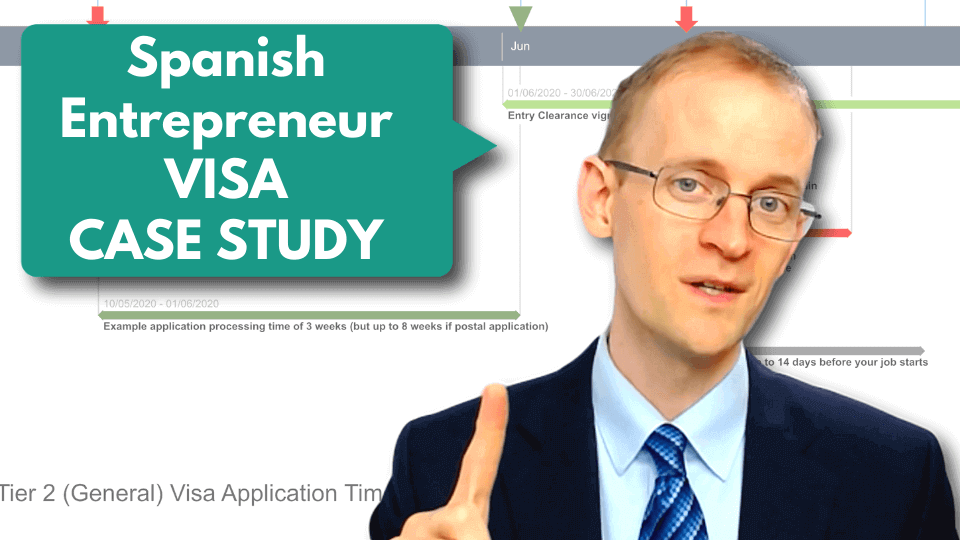
In this video, I interview Mary Clare, who is an entrepreneur who made a successful Entrepreneur visa application for Spain soon after the visa route first opened. She then successfully transitioned into a freelancer visa.
Here is the law on Entrepreneur visas for Spain:
“This Act is aimed at investors, entrepreneurs, highly skilled professionals, researchers, and workers performing inter-company business operations, including their spouses and children under 18.
The Act facilitates a swiftness of processing, generally establishing a resolve within 10 days for all visa applications relevant to this law.
The Residence Visa issued under this law is sufficient to reside in Spain for one year without having to obtain a foreign identity card. The renewal of residency may take place even if absences exist for longer than six months per year in the case of Residency Visas and authorisations for foreign investors and for foreign workers performing inter-company operations abroad or that have established their base of operations in Spain.”
The general requirements of the Spanish entrepreneur visa include that you are:
1. To be regularly on Spanish soil.
2. Be older than 18 years.
3. No criminal record in Spain or countries lived in during the last 5 years for offences stipulated under Spanish Law.
4. Not listed as objectionable in the territorial space of countries with which Spain has signed an agreement in this regard.
6. Have a public insurance or private health insurance with a Health Insurance Institution authorised to operate in Spain.
8. You have sufficient financial resources for yourself and for the members of your family during the period of residency in Spain (€2.130 monthly for yourself and €532 for every family member that is in your care).
9. You pay the fee for the processing of visa(s).
The law on freelancer visas for Spain allows for a foreigner to enter Spain to live and carry out work or professional self-employment activities.
Key points include:
This visa must be applied for in person.
Application must be submitted at the earliest 90 days in advance to the expected date of travel.
Residence visas must be picked-up within a month, counting from time you received the notification that it was approved. If later than 30 days, visas will be canceled.
Within the valid time period of the visa, business activities must start and you must register with the Spanish Social Security.
The documents you have to submit for the Spanish freelancer visa include:
1. Visa application form and visa Documents Checklist (Original and photocopy). The application form must be filled out in capital letters and signed.
2. One passport-type photo (white background, 2×2″) glued to the form.
3. Passport or Travel Document. (original and photocopy of the main page). Passport should be no older than 10 years. Please make sure your passport has at least one blank page for the new visa.
4. I.D. Card that proves your place of residence is within the jurisdiction of the Spanish Consulate (original and a photocopy). You can provide one of the following documents: U.S. Driver license, State I.D. card, Voter’s Registration Card, current Student I.D.
5. (Non-US Citizens only) Alien Registration Card or long term U.S. Visa. (Original and a photocopy).
– Holders of B-1 and B-2 Visas cannot apply in the United States; they must apply in their country of residence or country of origin.
– Applicants holding Student Visas must also submit their I-20 signed by the university on the last page and a copy of their F-1 Visa.
6. EX 07 Form
7. Model 790-52 Form (plus taxes).
8. Model 790-62 Form (plus taxes)
9. Business Plan of Activities that will be carried out, with the anticipated investments shown, your projected profits and the possible amount of jobs created.
10. Copy of Documentation that proves the respective training needed, in each case, the professional qualification/certification legally required for the appropriate professional tasks.
11. Proof of sufficient economic funds, or contracts of investments or loans from financial institutions. There must be evidence of sufficient funds to establish and maintain employment indefinitely.
12. Work Permits or Licenses that sanction the building, opening and operation of the planned project.
13. Certification of “absence of police records” (18 years of age or older) (Original, photocopy, translation into Spanish, photocopy of translation): Obtain a background check verified by fingerprint comparison. This document is valid for 3 months in reference to the date that it was issued. It must be legalised with the “Apostille of The Hague” and then translated into Spanish.
